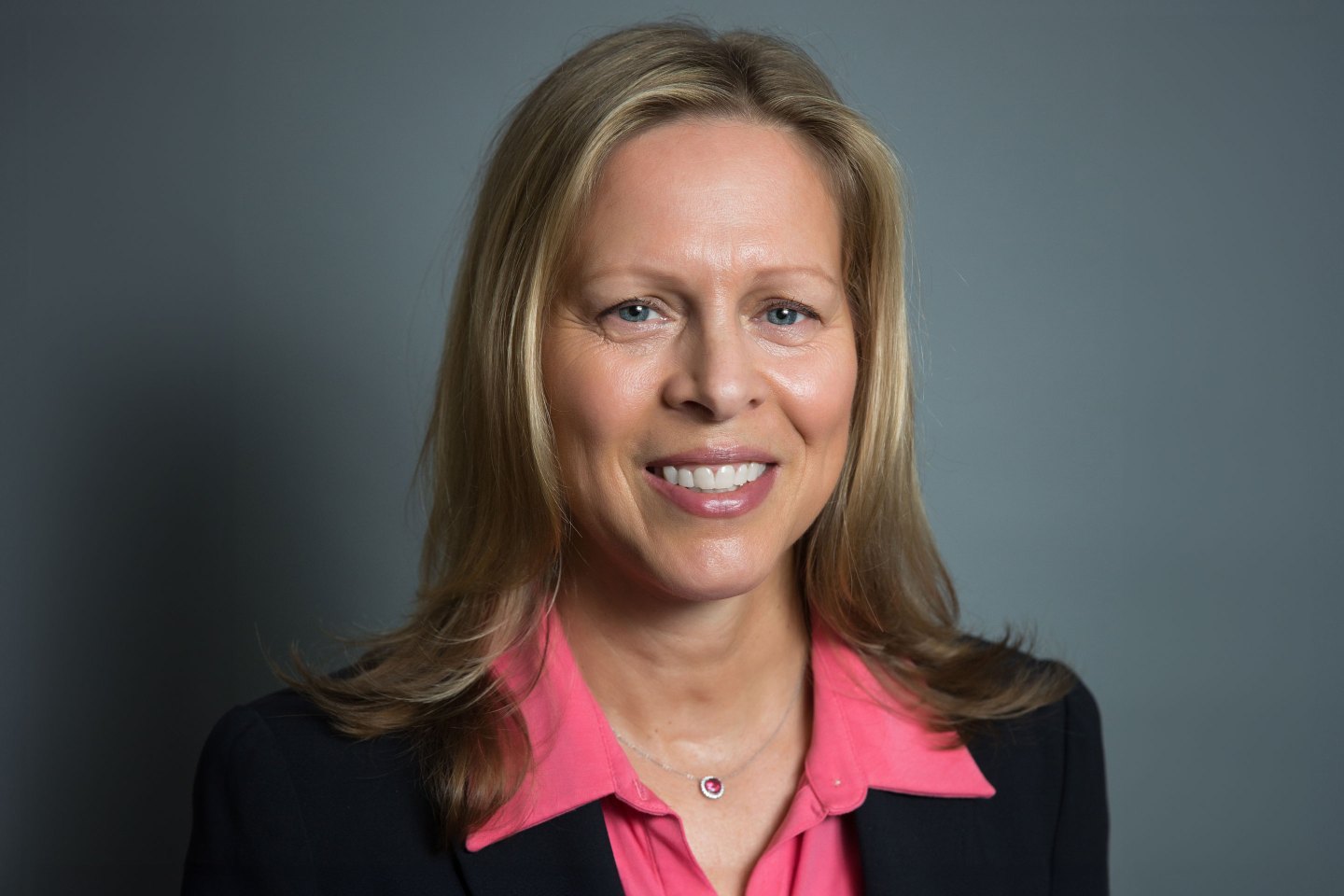Good morning, Broadsheet readers! Nextdoor’s newly appointed CEO was accused of sexual harassment, women are leaving Goldman Sachs after hitting its glass ceiling, and the Big East commissioner knows we’re all watching Caitlin Clark. Have a restful weekend!
– Big views. A decade ago, Val Ackerman wrote an influential paper laying out growth strategies for women’s basketball, including some long-term and some easier fixes like a move from two halves to four quarters. Now the former WNBA president and current Big East commissioner is seeing that growth occur in real time at the professional and collegiate levels.
Ackerman grew up as a young athlete in the pre-Title IX era when girls’ sports weren’t guaranteed resources. She played college basketball at the University of Virginia (post-Title IX) and got her first job in sports as a lawyer for the NBA. She was the first president of the WNBA when it was founded in 1996. She became Big East commissioner in 2013.
In her current role, Ackerman says she’s essentially juggling two jobs: the day-to-day business of keeping an athletic conference running across almost two dozen men’s and women’s sports at 11 schools and the ongoing transformation of college sports, thanks to reforms like name-image-likeness deals allowing players to earn significant income for the first time.
Exposure from those NIL deals is one factor in the extraordinary growth of women’s college basketball—and of women’s college sports in general. The uproar over the huge gap in equipment in men’s and women’s weight rooms at the NCAA basketball tournament in 2021 put a spotlight on inequities for male and female college athletes. Then there was the decision, only that year, to allow women’s basketball to officially use the term “March Madness.” (Ackerman says she didn’t even realize it wasn’t allowed before then and the rule change was “basic.”) This year, a new ESPN deal valued women’s college hoops at $65 million, a 10-times increase from its last media deal.

Courtesy of Big East Conference
Every women’s college basketball fan, old and new, this year is watching Caitlin Clark, who drove record viewership numbers for the Iowa Hawkeyes, part of the Big Ten. The Big Ten final was the most-viewed women’s basketball game on CBS since 1999, averaging 3 million viewers. Ackerman calls Clark a “phenomenal talent” thanks to her “playmaking ability and amazing shooting range.” “She’ll bring a lot of fans along with her,” Ackerman says of the effects of Clark’s fandom on the sport as a whole as March Madness continues. (Ackerman spoke to me from a hotel room at the Mohegan Sun in Connecticut, where UConn and another basketball phenom, Paige Bueckers, defeated Georgetown in the Big East championship.)
As women’s college sports become more of a business, Ackerman aims to support athletes pursuing brand and sponsorship deals while holding onto the more traditional ethos of college athletics, in which sports can offer students an opportunity to earn a degree without becoming their careers.
“The crystal ball is pretty cloudy here,” she says of the future of college sports. “I just hope whatever model this morphs into can hold onto our basic principles.”
Emma Hinchliffe
[email protected]
The Broadsheet is Fortune’s newsletter for and about the world’s most powerful women. Today’s edition was curated by Joseph Abrams. Subscribe here.
ALSO IN THE HEADLINES
– Controversy Nextdoor. Nextdoor defended its decision to reappoint founder Nirav Tolia as CEO of the neighborhood social networking platform amid reports that a former employee had accused him of sexual harassment. (Tolia is replacing former CEO Sarah Friar.) A spokesperson says Tolia was investigated for the incident in 2018; the board “took appropriate corrective action,” including “harassment prevention training.” The Information
– Dead-end investment. Since late 2018, approximately two-thirds of Goldman Sachs’ women partners have left the investment bank or lost their partner title as the firm continues to shut women out of its most coveted positions. CEO David Solomon, who’s publicly promoted the need for gender diversity in senior ranks, will host a dinner with women partners at the firm on Monday to explain the attrition and why no women lead any of the bank’s major divisions. The Wall Street Journal
– Manager moves. EY’s incoming CEO Janet Truncale named four global managers to work under her when she takes over in July and hinted at cutting costs at the Big Four firm. Financial Times
– Royal treatment. Meghan, the Duchess of Sussex has a new lifestyle brand. American Riviera Orchard is her first major business venture since leaving the British royal family four years ago and is inspired by her home in Montecito, Calif. Vogue
– Closing its doors. Outdoor Voices, the once-hot athleisure brand, is closing all its stores and going online-only. Founded by Ty Haney a decade ago, the brand has struggled in recent years. New York Times
– VP visit. Vice President Kamala Harris became the first president or vice president to visit an abortion clinic when she toured a Planned Parenthood clinic in Minnesota on Thursday. The vice president spoke with staff and health care providers at the clinic for the sixth stop on her “Fight for Reproductive Freedom” tour. NBC News
ON MY RADAR
IVF has largely restarted in Alabama. Patients are still worried Wall Street Journal
The Kate Middleton mess should terrify brands on social media Bloomberg
Melissa Benoist hits the campaign trail in The Girls on the Bus The New York Times
PARTING WORDS
“I feel that I’m getting to a point of abundance in which I’m a bigger, stronger, more tenacious woman than I’ve ever been.”
— Musician and actress FKA Twigs on looking inwards to survive periods of public controversy
This is the web version of The Broadsheet, a daily newsletter for and about the world’s most powerful women. Sign up to get it delivered free to your inbox.
